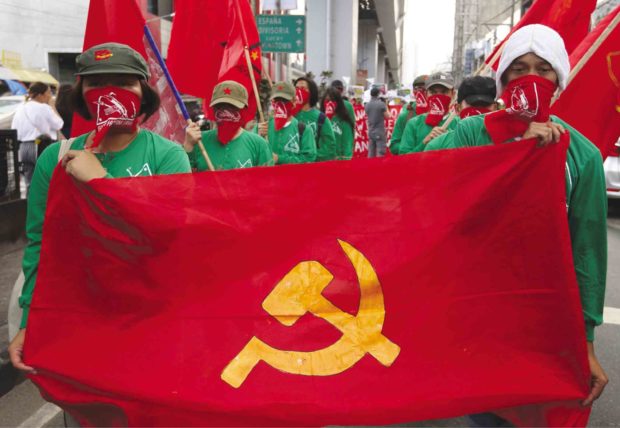
A rally of the New People’s Army in 2019. (INQUIRER FILE PHOTO)
MANILA, Philippines — The National Amnesty Commission (NAC) said it was preparing for the crafting of application protocols and other rules while awaiting President Ferdinand Marcos Jr.’s issuance of an amnesty proclamation for rebels that he promised during his State of the Nation Address (Sona) in July.
Speaking at the Laging Handa public briefing on Monday, NAC Executive Director Maria Victoria Cardona said there was no confirmation yet on when the amnesty proclamation would be issued.
“We are hopeful with the pronouncement of our president during the Sona that he will issue a proclamation to grant amnesty to former rebels so we are hopeful he would issue it soon so that the commission can already fulfill its main mandate, that is, to receive and process applications,” Cardona said.
In his Sona, Marcos said his administration was dedicated to implementing reintegration programs for former combatants, which include capacity building and social protection. The President’s offer was backed by the Armed Forces of the Philippines.
In the meantime, the NAC has been establishing local amnesty boards and is preparing the implementing regulations and rules of procedure for the application, processing, and grant of amnesty. These will be finalized and adopted as soon as Marcos issues the proclamation, she added.
Cardona said the NAC was also in touch with other member agencies such as the Office of the Presidential Adviser on Peace, Reconciliation, and Unity and the Department of Justice.
Communist groups
She said she was “hopeful” that the amnesty proclamation would cover members of the Communist Party of the Philippines-New People’s Army-National Democratic Front of the Philippines (CPP-NPA-NDFP).
The amnesty proclamations issued in 2021 by then President Rodrigo Duterte, she recalled, covered the CPP-NPA-NDFP, Revolutionary Proletarian Army, and Moro rebel groups but the Senate did not agree with the amnesty for CPP-NPA-NDFP members.
Cardona, who hails from the City of Borongan in Eastern Samar province, said the Eastern Visayas region had been described by the military as a “bastion” of the communist insurgency.
“Amnesty is just one of the core components of the peace process. It’s a bridge that will give a second chance, another opportunity for those former combatants or rebels who, probably because of injustice, poverty or whatever reason, fought or took up arms against the government,” she said.
Under the 1987 Constitution, the president shall have the power to grant amnesty with the concurrence of a majority of all members of Congress.
Cardona said the amnesty proclamations concurred in by Congress took effect in January 2022 so the one-year deadline for the application expired in January this year, the same month current NAC Chair Leah Tanodra-Armamento assumed office.
The CPP, however, had “firmly” rejected the offer of amnesty made by the President.
CPP spokesperson Marco Valbuena earlier said Mr. Marcos was “seriously mistaken” to think that the NPA would “line up to gain a few individual concessions in exchange for giving up the much bigger people’s cause which they have committed themselves to.”
Members of the Bangsamoro Transition Authority also expressed their wish that former members of Moro rebel groups, who signed peace deals with the government, be given blanket amnesty.
Some members of the Moro Islamic Liberation Front and the Moro National Liberation Front did not make it to the Jan. 24 deadline for amnesty application.